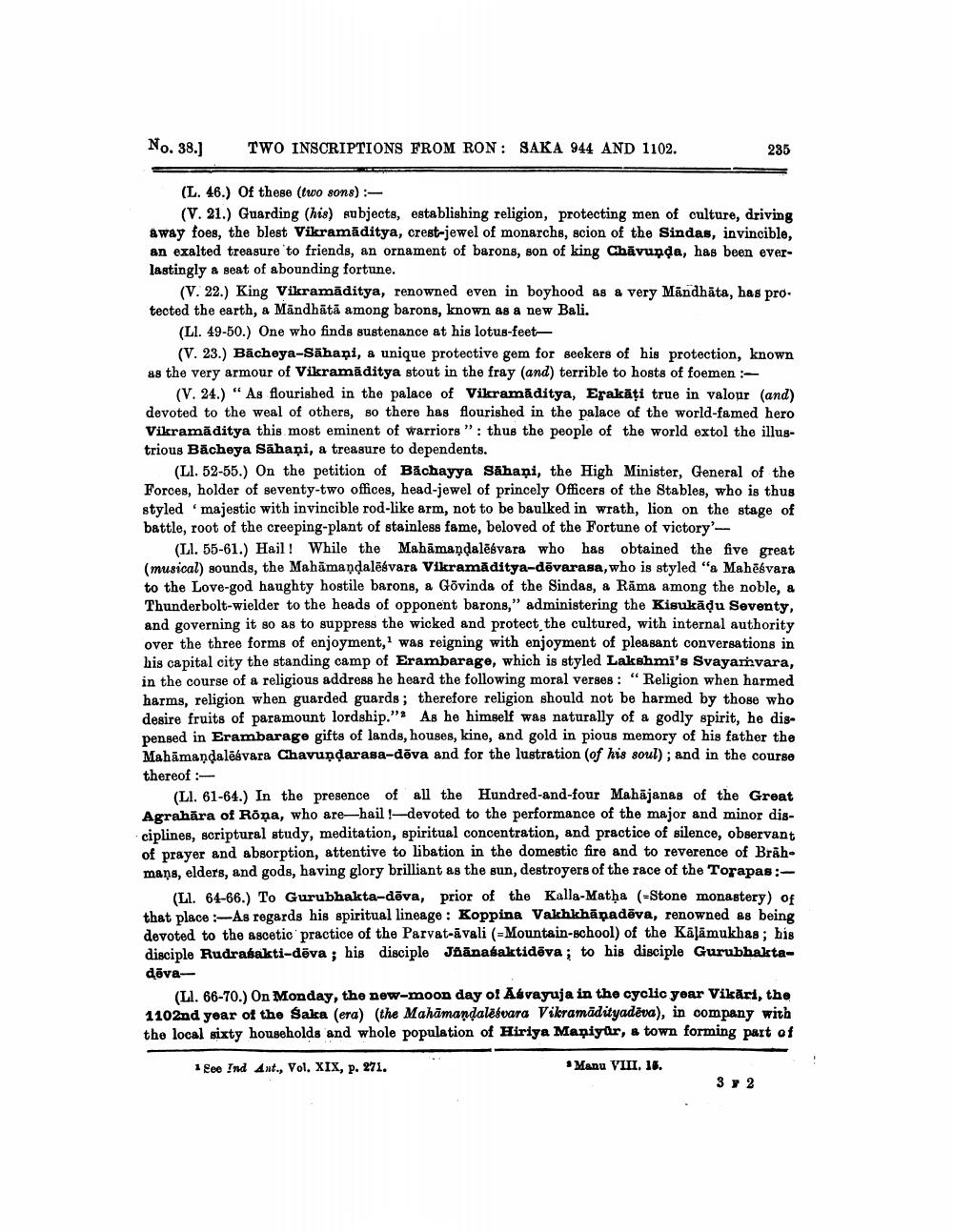________________
No. 38.]
TWO INSCRIPTIONS FROM RON: SAKA 944 AND 1102.
235
(L. 46.) Of these (two sons):
(V. 21.) Guarding (his) subjects, establishing religion, protecting men of culture, driving away foes, the blest Vikramaditya, crest-jewel of monarchs, scion of the Sindas, invincible, an exalted treasure to friends, an ornament of barons, son of king Chavunda, has been everlastingly a seat of abounding fortune.
(V. 22.) King Vikramaditya, renowned even in boyhood as a very Mandhāta, has protected the earth, a Māndhātā among barons, known as a new Bali.
(Ll. 49-50.) One who finds sustenance at his lotus-feet
(V. 23.) Bacheya-Sahani, a unique protective gem for seekers of his protection, known as the very armour of Vikramaditya stout in the fray (and) terrible to hosts of foemen :
(V. 24.) "As flourished in the palace of Vikramaditya, Erakāți true in valour (and) devoted to the weal of others, so there has flourished in the palace of the world-famed hero Vikramaditya this most eminent of warriors": thus the people of the world extol the illustrious Bācheya Sahaņi, a treasure to dependents.
(Ll. 52-55.) On the petition of Bachayya Sahaņi, the High Minister, General of the Forces, holder of seventy-two offices, head-jewel of princely Officers of the Stables, who is thus styled majestic with invincible rod-like arm, not to be baulked in wrath, lion on the stage of battle, root of the creeping-plant of stainless fame, beloved of the Fortune of victory'
1
(Ll. 55-61.) Hail! While the Mahamaṇḍalēsvara who has obtained the five great (musical) sounds, the Mahamandalesvara Vikramaditya-devarasa, who is styled "a Mahesvara to the Love-god haughty hostile barons, a Govinda of the Sindas, a Rama among the noble, a Thunderbolt-wielder to the heads of opponent barons," administering the Kisukāḍu Seventy, and governing it so as to suppress the wicked and protect the cultured, with internal authority over the three forms of enjoyment, was reigning with enjoyment of pleasant conversations in his capital city the standing camp of Erambarage, which is styled Lakshmi's Svayamvara, in the course of a religious address he heard the following moral verses: "Religion when harmed harms, religion when guarded guards; therefore religion should not be harmed by those who desire fruits of paramount lordship." As he himself was naturally of a godly spirit, he dispensed in Erambarage gifts of lands, houses, kine, and gold in pious memory of his father the Mahamandalesvara Chavuṇḍarasa-deva and for the lustration (of his soul); and in the course thereof :
(Ll. 61-64.) In the presence of all the Hundred-and-four Mahajanas of the Great Agrahara of Rona, who are-hail!-devoted to the performance of the major and minor disciplines, scriptural study, meditation, spiritual concentration, and practice of silence, observant of prayer and absorption, attentive to libation in the domestic fire and to reverence of Brahmans, elders, and gods, having glory brilliant as the sun, destroyers of the race of the Torapas:
(Ll. 64-66.) To Gurubhakta-dēva, prior of the Kalla-Matha (-Stone monastery) of that place:-As regards his spiritual lineage: Koppina Vakhkhāpadēva, renowned as being devoted to the ascetic practice of the Parvat-avali (=Mountain-school) of the Kāļāmukhas; his disciple Rudrasakti-deva; his disciple Jñanasaktideva; to his disciple Gurubhaktadēva
(Ll. 66-70.) On Monday, the new-moon day of Asvayuja in the cyclic year Vikari, the 1102nd year of the Saka (era) (the Mahāmaṇḍaleśvara Vikramadityadēva), in company with the local sixty households and whole population of Hiriya Maniyür, a town forming part of
1 See Ind Ant., Vol. XIX, p. 271.
Manu VIII. 16.
3 2




